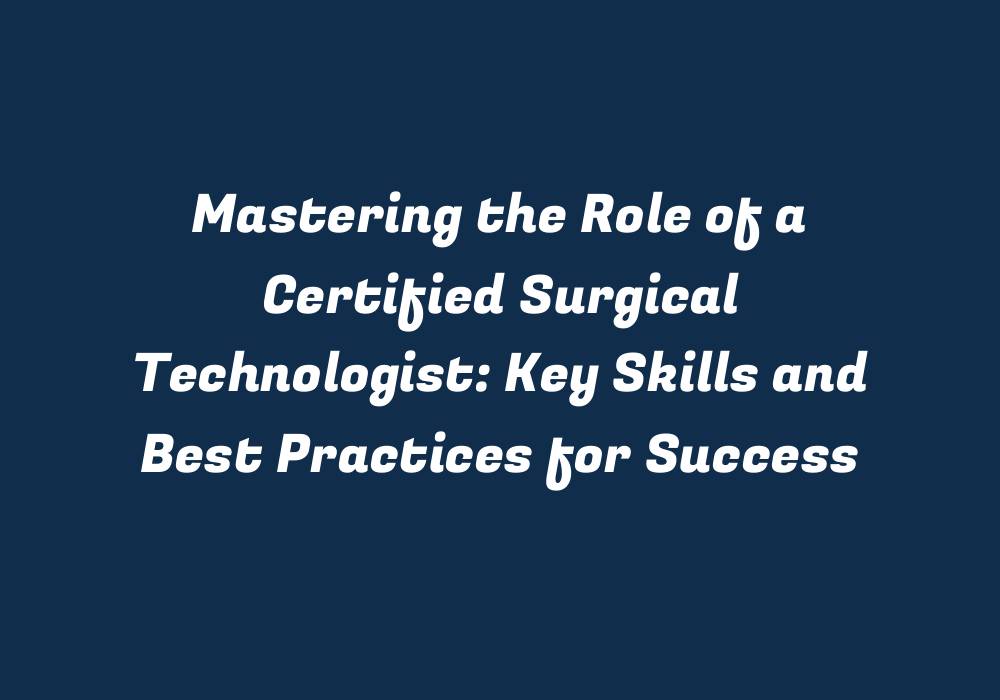Introduction to the Role of a Certified Surgical Technologist
In the fast-paced and ever-evolving healthcare sector, the role of a certified surgical technologist has grown increasingly vital. As an essential part of any surgical team, this professional plays a crucial role in ensuring seamless and safe operations. This article will discuss key skills and best practices that can contribute to a successful career as a certified surgical technologist (CST).
Understanding the Role
A certified surgical technologist is an expert in their field, often performing various tasks during surgical procedures. They are responsible for ensuring that all tools and equipment are prepared and readily available. The CST also maintains sterile conditions throughout the operation, assists with patient positioning, and may even contribute to closing incisions.
Essential Skills for a Successful CST
Mastering the role of a CST requires the development of essential skills that will not only enhance your performance but also facilitate professional growth. Some of these key skills are:
1. Technical proficiency: Adequate knowledge and understanding of surgical instruments, their use, and correct sterilization techniques is paramount for effective surgical procedures. CSTs must possess the ability to work quickly and efficiently while maintaining accuracy to prevent complications.
2. Attention to detail: One of the primary responsibilities of a CST is ensuring that all procedures are performed in accordance with established protocols, regulations, and guidelines. A keen eye for detail allows them to identify potential hazards, such as contamination risks or improper sterilization techniques, and correct these issues before they lead to complications during surgery.
3. Teamwork: Successful surgical procedures often depend on a collaborative effort between multiple team members, including surgeons, anesthesiologists, and nurses. CSTs must possess strong interpersonal skills that allow them to communicate effectively with their colleagues, ask for assistance when necessary, and share important information during operations.
4. Organizational abilities: The role of a CST demands excellent organizational skills as they often manage and maintain surgical equipment inventories, ensure proper stock levels, and keep track of inventory records. They must also be able to prioritize tasks and delegate responsibilities when necessary to streamline workflow and achieve efficiency.
5. Continuous learning: The healthcare industry is rapidly evolving with advancements in technology, techniques, and protocols. To stay at the forefront of their profession, CSTs should embrace ongoing education and professional development opportunities, keeping themselves updated on current research and best practices.
Best Practices for Mastering Your Role as a Certified Surgical Technologist
In addition to possessing essential skills, mastering the role of a certified surgical technologist requires adherence to several best practices that can help enhance your overall performance and contribute to your professional growth. Some of these include:
1. Developing strong communication skills: Effective communication is critical for building trust with patients, colleagues, and other healthcare professionals. CSTs must be able to convey important information clearly and concisely while actively listening to feedback and concerns.
2. Embracing a learning mindset: Be open to constructive criticism from your peers and always strive to improve your knowledge and skills through continuous professional development. Seek out opportunities for further education, such as attending workshops or conferences or engaging in self-directed study.
3. Ensuring personal wellness: The demanding nature of the job often results in CSTs facing significant mental and physical stress. Taking care of your mental and physical health is vital to maintain a high level of performance in your role as a surgical technologist.
4. Staying abreast with industry updates: Keep up-to-date on industry developments, new technologies, and updated surgical procedures by regularly reviewing professional journals and attending conferences related to your field. This will not only enhance your own knowledge but also demonstrate your commitment to providing the best care possible for your patients.
5. Networking with peers: Engage in regular networking opportunities with colleagues from various healthcare fields, including surgeons, anesthesiologists, nurses, and other CSTs. This can help you gain valuable insights into different perspectives on surgical procedures and build strong professional relationships that support your career growth.
In conclusion, mastering the role of a certified surgical technologist requires dedication to continuous learning, personal development, and a commitment to upholding the highest standards in the industry. By focusing on essential skills and implementing best practices throughout their careers, CSTs can not only enhance their own performance but also contribute significantly to the overall success of the surgical team they are part of.
